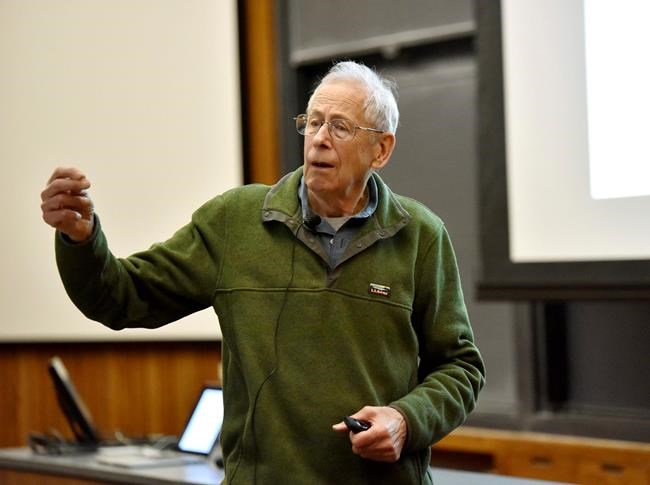‘Looking at the world around us:’ Canadian scientist wins Nobel Prize in physics
Advertisement
Read this article for free:
or
Already have an account? Log in here »
To continue reading, please subscribe:
Monthly Digital Subscription
$0 for the first 4 weeks*
- Enjoy unlimited reading on winnipegfreepress.com
- Read the E-Edition, our digital replica newspaper
- Access News Break, our award-winning app
- Play interactive puzzles
*No charge for 4 weeks then price increases to the regular rate of $19.00 plus GST every four weeks. Offer available to new and qualified returning subscribers only. Cancel any time.
Monthly Digital Subscription
$4.75/week*
- Enjoy unlimited reading on winnipegfreepress.com
- Read the E-Edition, our digital replica newspaper
- Access News Break, our award-winning app
- Play interactive puzzles
*Billed as $19 plus GST every four weeks. Cancel any time.
To continue reading, please subscribe:
Add Free Press access to your Brandon Sun subscription for only an additional
$1 for the first 4 weeks*
*Your next subscription payment will increase by $1.00 and you will be charged $16.99 plus GST for four weeks. After four weeks, your payment will increase to $23.99 plus GST every four weeks.
Read unlimited articles for free today:
or
Already have an account? Log in here »
Hey there, time traveller!
This article was published 08/10/2019 (2263 days ago), so information in it may no longer be current.
James Peebles, a Manitoba-born scientist who won the Nobel Prize for physics on Tuesday, said his relatively quiet life isn’t so quiet anymore.
Peebles, who was born in the francophone community of St. Boniface before it became part of Winnipeg, completed his undergraduate studies at the University of Manitoba before moving to Princeton University in New Jersey for graduate school.
A dual Canadian-U.S. citizen, he has taught at the Ivy League school for the last five decades.

Peebles, 84, has been retired for 20 years, but he says he has continued to research and teach at a “relaxed rate” because he enjoys it.
“Life will go on,” he said in a phone interview between media events. “I suppose the aura of the Nobel is such that my life will change, but I don’t think I’m going to let it change much.
“You understand, I’m used to a quiet life.”
The Nobel committee said it gave Peebles the honour because his work is the basis of our contemporary ideas about the universe from the big bang to the present day.
“The field has exploded,” Peebles said. “It’s just a remarkable extension of well-tested natural science … so it should be recognized. And I’ve been working on it longer than anyone.”
He also told news conferences Tuesday that while awards are “very much appreciated,” that’s not why young people should study science.
“You should enter it for the love of the science,” he said. “You should enter science because you are fascinated by it. That’s what I did.”
Peebles said part of his childhood in Manitoba was spent building or taking apart thing such as the clocks in his family’s home.
“One of my earliest memories is throwing a tantrum because I wasn’t allowed to put together the coffee percolator,” he said.
“I simply liked looking at the world around us.”
Neil Turok, who worked with Peebles at Princeton and now serves as director of the Centre for the Universe at the Perimeter Institute in Waterloo, Ont., described his former colleague as an unsung hero, famous in the world of cosmology, but seldom recognized outside of it.
“Jim is one of the most modest people in the field. His contributions are frequently overlooked. The experts know you can’t oversee him,” Turok said.
Peebles has honorary doctorates from a string of Canadian universities and is a fellow of the Royal Society of Canada and the Order of Manitoba.
He is also the author or co-author of five books, including “Physical Cosmology” and “Finding the Big Bang.” He said he has a sixth book coming out next year, which maps the history of cosmology from Albert Einstein to today.
Peebles shares the Nobel Prize with Swiss scientists Michel Mayor and Didier Queloz, who won for the discovery of an exoplanet orbiting a solar-type star. Mayor and Queloz announced their discovery 24 years ago.
The three men will share a nine-million kronor (C$1.2 million) cash award, a gold medal and a diploma. The laureates are to receive them at a ceremony in Stockholm on Dec. 10.
Peebles said he plans to give some of his winnings to charity and his family. “I owe a lot to the University of Manitoba and a chunk will go to it.”
David Barnard, president of the University of Manitoba, said Peebles’s achievements have inspired new generations of scientists.
Prime Minister Justin Trudeau tweeted his congratulations and Manitoba Premier Brian Palliser issued a statement.
“As Manitobans, we know looking to the vast night sky is often a powerful experience,” Pallister wrote. “Dr. Peebles has reminded us that it can also be the beginning of a journey towards knowledge, achievement and academic excellence to be shared with the world.”
Peebles is the second Canadian in a row to win the physics prize. The University of Waterloo’s Donna Strickland was honoured last in 2018.
Arthur McDonald, a retired professor at Queen’s University, won physics prize in 2015.
This report by The Canadian Press was first published Oct. 8, 2019.
— With files from The Associated Press and Kelly Geraldine Malone in Winnipeg
Note to readers: This is a corrected story. An early version said Peebles took part in news conferences Friday.



